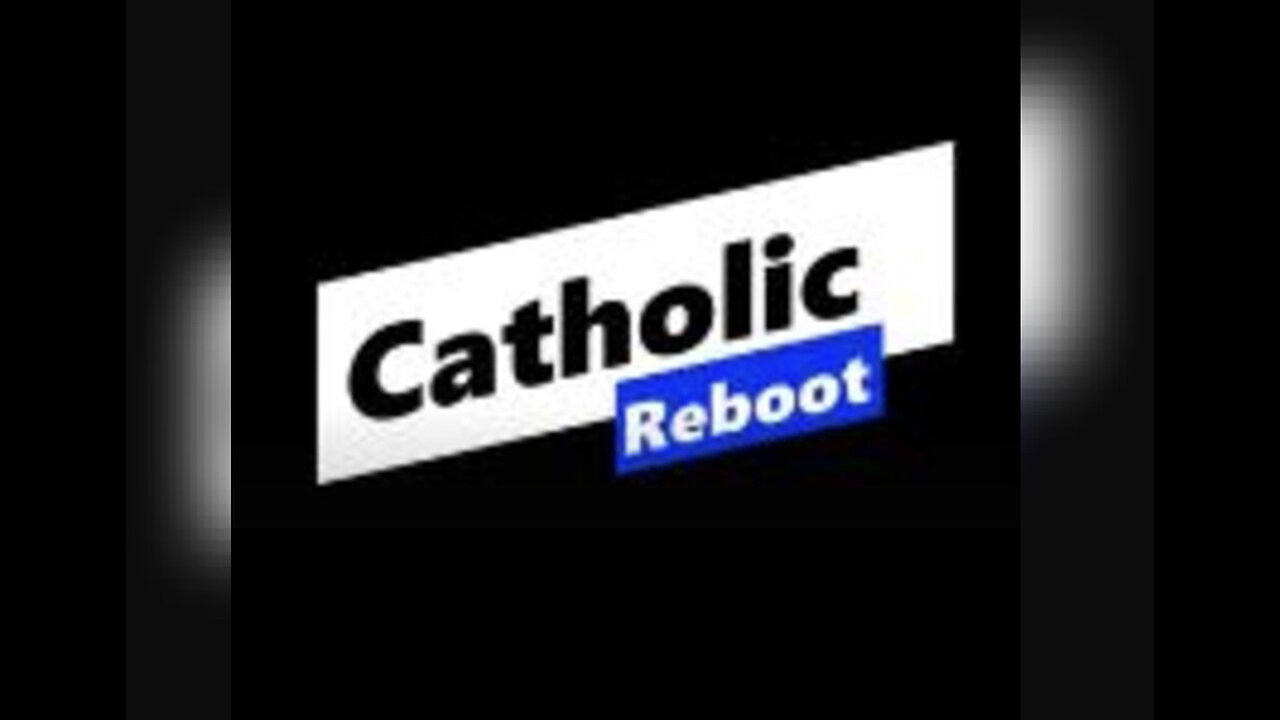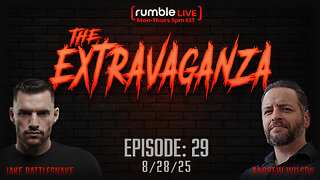Premium Only Content

Episode 1182: Communion
John 6:32, 51-52: "Then Jesus said to them:
Amen, amen I say to you; Moses gave you not bread from heaven,
but my Father giveth you the true bread from heaven...
I am the living bread which came down from heaven.
If any man eat of this bread, he shall live for ever;
and the bread that I will give, is My Flesh, for the life of the world."
First, a definition: "Holy Communion" is the reception of the Blessed Sacrament (the Eucharist) that has been confected by a priest during the Holy Mass. The Blessed Sacrament may only be received sacramentally by one who:
is a living human being
is baptized
has proper intent
has fasted the proper amount of time: 3 hours is the 1962 practice that most traditional Catholics follow (some follow the older practice of a 12-hour fast); 1 hour is what we are canonically bound to by the 1983 Code of Canon Law. Viaticum -- the "Food for the Journey" given during Extreme Unction -- may be given at any time.
is in a state of grace, i.e., is not in a state of mortal sin. If one is in a state of mortal sin, he must go to Confession first lest he sin further as St. Paul warns in I Corinthians 11:26-30:
Therefore whosoever shall eat this bread, or drink the chalice of the Lord unworthily, shall be guilty of the body and of the blood of the Lord. But let a man prove himself: and so let him eat of that bread, and drink of the chalice. For he that eateth and drinketh unworthily, eateth and drinketh judgment to himself, not discerning the body of the Lord. Therefore are there many infirm and weak among you, and many sleep.
In addition, because Communion is also a sign of Christian unity, those who receive are declaring to the world that they accept all of the dogmas of the Church. Canon 915 of the 1983 Code of Canon Law affirms the Apostolic practice of the Church in insisting that priests refuse Communion to those who are "manifest, obstinate, persistent sinners" -- i.e., those who are public sinners (which includes those who publicly disagree with Church teaching) who refuse to publicly repent -- lest they cause scandal and confuse others as to what Church teaching is. Those who disagree with what the Church teaches should not try to receive Communion.
Summary: one in grave sin is to police himself and refrain from receiving Communion until he's received the Sacrament of Penance. If he fails to, his spiritual father is to advise him, if possible, in order to make him aware of his sin and of the added sin of receiving Communion while not in a state of grace. If, after being advised by his spiritual father, he still fails to police himself, he may be refused the Eucharist if (and only if) the grave sin is a public one (e.g., if he is a heretic or schismatic, if he publicly sins and doesn't publicly repent, if he publicly proclaims positions contrary to the Faith, etc.). Private sins are between the individual, his priest, and God. A priest can't refuse Communion to someone who is guilty of grave sin done privately because a priest can't publicly reveal the private sins of anyone.
The Eucharist must be received at least once a year, during the Easter Season, by those who've reached the age of reason, though frequent -- even daily -- Communion is encouraged. Traditionally, the Eucharist shouldn't be received more than once a day unless it is given as Viaticum during Extreme Unction (the 1983 Code of Canon Law strangely allows for a second reception of the Eucharist "only within a eucharistic celebration in which that person participates.")
The matter of the Sacrament itself are wheat bread made only of flour and water, with nothing added (no honey, no spices, etc; nothing may be added; the use of leavening in the Latin Church is illicit) and wine fermented from grape juice. The former is confected by God through a true priest using the words:
This is My Body
Latin:
Hoc est enim Corpus Meum.
The latter is confected by the words "this is the Chalice of My Blood," which are spoken in the below context in the traditional Mass:
For this is the Chalice of My Blood, of the new and eternal Testament: the Mystery of Faith: which shall be shed for you and for many unto the remission of sins
Latin:
Hic est enim Calix Sanguinis mei, novi et aeterni testamenti: mysterium fidei: qui pro vobis et pro multis effundetur in remissionem peccatorum.
After the substance of bread and wine are changed into His Body and Blood, the accidents -- the appearance, taste, texture of bread and wine -- remain, but what looks like "bread" and "wine" are, in substance, the Body, Blood, Soul, and Divinity of Christ. In other words, outside of Eucharistic miracles which have taken place over 2,000 years, what the eyes and mouth see and taste are the accidents of "bread" and "wine," but what is truly received is Christ and remains Christ until and unless the accidents change such that they are no longer compatible with the species of "bread" and "wine." By this we know, for example, that once the Host goes into one's stomach and is digested, or if a liquid were added to the Precious Blood such that the accidents are no longer recognizable as the accidents of "wine," the Sacrament is no longer there.
Because of the above, it is not okay to refer to the Blessed Sacrament as "bread" or to the Precious Blood as "wine." Once the bread and wine have been consecrated, they are no longer "bread" and "wine"; they are Christ -- Body, Blood, Soul, and Divinity, and the proper words to use to speak of them are "Blessed Sacrament," "Eucharist," "Precious Blood," "Sacred Host" ("Host" comes from the Latin word "hostia" meaning "victim"), etc. The consecrated Hosts and Precious Blood are and will remain Christ regardless of the faith of the people in the pews. They are and will remain Christ whether on the Altar or in the tabernacle or in your mouth or, God forbid, on the floor. They are and will remain Christ for ten years or a thousand years, as long as the accidents of bread and wine remain.
That said, note that the accidents of bread and wine remain even as their substance changes. And the accidents of bread might mold, the accidents of wine might sour, and so forth, even though Christ is truly present. So please note: those who think that receiving Communion incorrectly or if the accidents were to become contaminated brings no risk of transmission of a virus or bacteria -- say, for ex., if two or more people were to drink the Precious Blood from the same chalice -- are wrong.
The Precious Blood is always consumed totally by the priest at the Mass, and the priest will always consume one Sacred Host, distributing others to the people, if present. Remaining Hosts are kept in a ciborium inside the tabernacle between Masses, and this Divine Presence is signalled to us by the sanctuary lamps that burn always outside the tabernacles of our churches and invite us to adore Him and be in His Presence to pray.
The effects of receiving the Sacrament are:
union, by love, with Christ
an increase in sanctifying grace in the soul when received by a "living member of the Church" (i.e., one who is in a state of grace)
the blotting out venial sin and preserving the soul from mortal sin, in proportion to the communicant's devotion
the rewards promised by Christ in His words, "He that eateth My Flesh and drinketh My Blood, hath everlasting life: and I will raise him up on the last day."
The most proper way to receive the Blessed Eucharist at the altar rail at Mass is to kneel, keep your eyes downcast, and fold your hands in the "prayer" gesture at about mid-chest level, no higher (or place them under the houseling cloth at the altar rail, if such a cloth is used; don't touch the cloth or the rail in either case). When the priest reaches you and it is time for you to receive Christ, an acolyte or altar boy will hold a paten underneath your chin so that no precious particles will fall to the floor. The priest will bless you by making a Sign of the Cross with the Sacrament (a small one in the air) and then place the Sacrament on your tongue, all while saying these words:
Corpus Dómini nostri Jesu Christi custódiat ánimam tuam in vitam æternam. Amen.
May the Body of Our Lord Jesus Christ preserve your soul unto life everlasting. Amen.
-
 LIVE
LIVE
LIVE WITH CHRIS'WORLD
4 hours agoLIVE WITH CHRIS’WORLD - YOU DON’T HATE THE MEDIA ENOUGH!
166 watching -
 LIVE
LIVE
SavageJayGatsby
1 day agoFirst Rumble Exclusive Stream?! | Let's Play: Prey | $300 Weekly Goal for Spicy Bite Saturday
160 watching -
 11:42:24
11:42:24
GritsGG
12 hours agoWin Streaking! Most Wins 3485+ 🧠
36.9K1 -
 LIVE
LIVE
Quite Frankly
6 hours ago"Mixed News, RFK Pull-up Challenge, Calls" ft. J Gulinello 8/28/25
514 watching -
 1:14:52
1:14:52
TheCrucible
4 hours agoThe Extravaganza! EP: 29 (8/28/25)
93.8K8 -
 1:09:58
1:09:58
Kim Iversen
4 hours agoTrans. Russian. Anti-Israel. Anti-Trump. Are You Buying This Story?
41.8K77 -
 1:51:08
1:51:08
Redacted News
4 hours agoEMERGENCY! BILL GATES CULT MEMBERS FOUND PLANTED INSIDE MULTIPLE FEDERAL AGENCIES, RFK FURIOUS
140K110 -
 31:02
31:02
Kimberly Guilfoyle
5 hours agoFull Breaking News Coverage: Live with John Nantz & Steve Moore | Ep250
28.6K13 -
 1:15:19
1:15:19
vivafrei
6 hours agoShameless Politicization of Tragedy! Susan Monarez is OUT! Pritzker is an IDIOT! & MORE!
130K53 -
 9:52
9:52
Tundra Tactical
4 hours ago $0.44 earnedCracker Meme Review On Tundra Meme Review!!
12.6K